 I mentor mothers and one of the things we always have to work on is their tendency to believe that they are falling short, they are never going to measure up and that they are ruining their kids.
I mentor mothers and one of the things we always have to work on is their tendency to believe that they are falling short, they are never going to measure up and that they are ruining their kids.
If you have read the introduction to my new book Becoming a Present Parent then you know that I was not a perfect parent. I came into it with lots of baggage, few skills, and a lot to learn. Our family wasn’t perfect either. We had some really tough times.
That was one reason I used to hate Mother’s Day because I knew I didn’t measure up.
A few years ago my daughters hijacked my website for a surprise gift for me on Mother’s Day. Here is what they said – “We wanted to share with all of you, her dear readers and friends, how honored we are to be her daughters and what she means to us. We are grateful for your joining with us to celebrate our mother and yours. We hope you enjoy this song, in celebration of our mothers as you read.”
I enjoyed reading their words again this year, they made me cry. I am astonished at how they see me. They see what I haven’t always been able to see in myself. It takes a lifetime to find out just what a good job you have done. I was in my sixties when I read these words from my daughters for the first time and knew that although I was imperfect, it had been enough.
We really are doing better than we think – despite any mistakes we may be making. Take heart this Mother’s Day and know that you are doing better than you think.
Kate Housten
 I remember one of my favorite things when I was living at home was sitting in our “library” with you talking about our love for books. You taught me to hunger for knowledge.
I remember one of my favorite things when I was living at home was sitting in our “library” with you talking about our love for books. You taught me to hunger for knowledge.
When I was young you showed me how to make a meal out of almost nothing, how to grow a beautiful garden, and how to REALLY clean. You taught me how to be a homemaker.
The summer I wanted to study abroad in Europe and we had no money, you spent the whole summer baking cakes and selling water bottles with me. You taught me how to work for what I want and be creative doing it.
When I wanted to be a varsity cheerleader my senior year of high school, even though I had NEVER cheered before, you were right there the day of tryouts to make sure I stuck it out until the end. You taught me how to dream, and dream big.
Growing up you loved to teach us how to make sugar eggs, gingerbread houses, and frosting flowers for cakes. You taught me the importance of cultivating my talents.
When you were in your 40’s, you had seven children, an incredibly busy life and yet you finished your master’s degree. You taught me the value of education.
When times were tough and family life was especially hard I’d walk past your open bedroom door and ALWAYS see you on your knees. You taught me how to have a relationship with Heavenly Father and Jesus Christ.
Mom, it’s easy for us to look back on our time as a mother and wonder if anything we did gave our children what they needed to be successful in their lives. Sometimes we look back and feel discouraged because as far as we can see, what we did wasn’t enough. But it’s the little things, the daily things you taught me that made all the difference. Because you were the person that you were, I am the person that I am today. Through your service to others, you taught me how to serve. Through your example of forgiving and being patient, you taught me how to forgive and be patient. Because you grew and blossomed, like the flowers out back in our garden, you taught me how to grow and blossom.
Now I’m getting ready to take my first steps into motherhood and because of you, I am not afraid. You have already walked the path down this unfamiliar road and through the wisdom you have gained, you will teach me what it truly means to be a mother.
Thank you, mom,
Kate
Marie Henry
 There are so many things that I have learned from you but there are two things in particular that have forever changed me and how things have gone in my life. The first one was prayer. I remember always walking in on you praying. I knew Heavenly Father was your friend and that you trusted him.
There are so many things that I have learned from you but there are two things in particular that have forever changed me and how things have gone in my life. The first one was prayer. I remember always walking in on you praying. I knew Heavenly Father was your friend and that you trusted him.
When I decided to come back to the church I knew what to do. I knew I could talk to him about everything. That is was okay if I was angry, even at him, as long as I talked to him about it. That even if I sat their and said nothing at least I was in the right place. I knew I had to build up trusting him but I trusted you so I knew I would get there and that it would be okay.
The second thing was to never ever give up, that change is possible and that it is very real; that you need not give up hope. There is a way to return to happiness, and it is through Jesus Christ.
The past 13 years have been quite the journey for me and my family. There were times I didn’t think things would ever turn around or feel differently, but then I would pray and get through the day. I knew from watching you that no matter what, you don’t ever, ever give up. You continue to fight even if the answer takes years to come.
Now, look where I am at. I finally love being a mother, I feel content and peaceful with me and how things are going in my life, and I have the greatest man as my husband.
There are many things I get to pass on to my children but the two things I continue to tell them about is to always pray no matter how you feel and to never ever give up, that Heavenly Father is there for us and no matter what you fight to stay on his side.
I know that one day you were praying, in the kitchen I believe, and you said to Heavenly Father that we would have all been better off if he had just sent us to someone else. He said to you that may be true but he sent us to you. Well, I am proud that he did. I am very grateful to have you as my mother.
Our lives here on earth are meant to have trials in them. I left your home knowing how to make it through and come out the other side being a better me and closer to the Lord. Having fewer trials really doesn’t matter. That I know how to make it back home to Heavenly Father is what I came here to learn and learn it I did. I am grateful for the family I have and PROUD I get to say you are my mother. I love you.
Love,
Marie
Jenny Johnson
 I really love my mother. And it is one of those interesting loves; the bigger the love gets, the bigger my heart gets, and the more it makes me love the entire world. Amazing!
I really love my mother. And it is one of those interesting loves; the bigger the love gets, the bigger my heart gets, and the more it makes me love the entire world. Amazing!
I remember being a child and mom would take all of her 7 children with her to the nursing home on Sundays just to visit the patients who weren’t getting usual visitors. It was the family’s volunteer work. That is how I now kind of define my life. I prioritize (highly) having volunteer work in my life that serves the geriatric population.
Also, I just finished the endeavor of earning my Master’s degree. I will now start working as a professional to serve the geriatric population with different modes of therapy. I feel so happy and grateful because I know that working in this environment and serving this population is really going to feed my life, daily! She has taught me that despite possibly never bearing children, there is a viable way for me to mother this world! I serve…and it makes me happy. It is how I run my life. This is the legacy my mother has left in my life. An ocean of thanks to you, my sweet mother.
A handful of years ago, when I was in a severe car accident and wasn’t walking, my mother flew to California and took care of me for 4 months. I mean REALLY was taking care of me, as if her 30-year-old daughter was 3 again. Feeding me, cleaning me, helping me move from point A to point B, etc. That was such a wonderful blessing given to each of our lives because what came out of that intimate tragedy was that my mother became one of my dearest friends. I feel so supported, loved and valued and that, again, strengthens and augments my desire to serve and support this entire world, and it makes me love this world even more. A canyon of thanks to you, my sweet mother and friend.
What my wonderful, beautiful, vibrant mother is teaching me now about being a woman is that personal evolution never stops and it is never too late to become 10 times more than you have ever been. Beauty, wisdom, self-love, personal manifestation, grand service – these are things I am learning from her and really beginning to value because she is performing these things and becoming these things and mastering these things and it is all so amazing to watch! She is painting such a colorful masterpiece across the canvas of her life. She is leaving such a mark, and I feel so honored and blessed to be apart of it. I love you mom, to the moon and back! A universe of thanks to you for everything.
Jenny Rebecca
Jodie Palmer
 I turned 40 years old a few weeks ago. It’s sort of a surreal experience for me because it’s the only age that I distinctly remember my mother being. She gave birth to her last child at 40, and so have I. I am now where my mother once was, a place I remember her being.
I turned 40 years old a few weeks ago. It’s sort of a surreal experience for me because it’s the only age that I distinctly remember my mother being. She gave birth to her last child at 40, and so have I. I am now where my mother once was, a place I remember her being.
A fascinating thing has happened now that I’m standing in the shoes I remember my mother wearing. She has suddenly transformed into something more than my mother. I’m connecting with her as a woman.
It’s been hard to try to put this transformation into words or describe what it means to finally see my mother as a woman.
I hate to admit it, but my mother has never been a “real” woman to me. She’s been . . . my Mother. Something different than, “a woman.”
Through my life, I’ve been walking these antipodal paths of both discovering who I am as a woman, and consciously putting myself together into who I want to be. But the change that has happened for me is that I am beginning to see my mother in the context of who I am as a woman—this complicated mixture of contradictions and messiness, grace and beauty, vices and flaws, backbone and tenacity, soft and tender places, guarded and hidden places, confusion and wisdom, fullness and emptiness and so much more all wrapped up in one heart.
I find myself feeling so tender towards her, not in a reminiscent way, as is usual for Mother’s Day, but in this current, primal, female, connected, Red Tent sort of way.
As I was attempting to write this tribute to her I came up with my usual celebrations of memories, the ones that have informed my whole worldview and way of being with the world. Like the time she packed us all into the car to return something that had recently been purchased because we needed the money. On the way out of the parking lot, there was a man holding a sign asking for help. She rolled down the window and gave the man part of the change we had just received. She shared and gave, even when it hurt.
Or the time when she washed the body of a woman who had died who had no one in her life to give her that one last loving honor. She is a rememberer of the forgotten.
There are so many other memories that have served as the elements taken up as food by the beautiful garden of my life.
But, today I want to honor my mother differently than I have ever been able to before. I want to honor her as a woman. I want to honor her complicated, contradictory, messy, deeply beautiful, wise, lovely self. All of it is beautiful to me, and so needed by me, as a woman. All of her is so needed by the world. And the world is better for it—the little worlds of her children and grandchildren, the little worlds of her client families, the little worlds of her neighbors, and the strangers that cross her path. All these little worlds collide together in one big bang of goodness and beauty for all the rest of us.
That’s the beauty of women, we are wombs and birthers of beauty and goodness in the world through the complicated mixture of who we are. We are good for the world . . . And the Lord God looked and said, “It is good.”
I am honored to a woman born and grown from this woman. I am honored to have her blood and her bone, her spirit and her heart living in me.
I am grateful for these new eyes that have allowed me to not only see her differently but see my daughters differently. I newly see, and feel, that we are sisters, we are friends.
Love,
Jodie
HAPPY MOTHER’S DAY
 Father’s Day is coming so I am going to dedicate this space to fathers for a few weeks. : )
Father’s Day is coming so I am going to dedicate this space to fathers for a few weeks. : )



 My mom and dad weren’t perfect parents. They had a bagful of stuff which leads to parenting mistakes and I carried the effects of those mistakes in my own bag for many years. I had to work to throw out the junk and distill out the gold. Can I say that it has been worth the work and self-discovery and frankly, I have come to really appreciate my parents, their mistakes and how the process of distilling out the gold has impacted my life for good?
My mom and dad weren’t perfect parents. They had a bagful of stuff which leads to parenting mistakes and I carried the effects of those mistakes in my own bag for many years. I had to work to throw out the junk and distill out the gold. Can I say that it has been worth the work and self-discovery and frankly, I have come to really appreciate my parents, their mistakes and how the process of distilling out the gold has impacted my life for good? someone asked her to take a BIG red rooster. She was glad to have him until she discovered that he crowed all the time. Not just in the AM but all the time. So she had to keep him in the garage to keep her neighbors happy until she could find him a “farm” home. My mom named the big red bird Trumpet because he constantly trumpeted the fact that he was here and alive! While my sister was there he got out.
someone asked her to take a BIG red rooster. She was glad to have him until she discovered that he crowed all the time. Not just in the AM but all the time. So she had to keep him in the garage to keep her neighbors happy until she could find him a “farm” home. My mom named the big red bird Trumpet because he constantly trumpeted the fact that he was here and alive! While my sister was there he got out.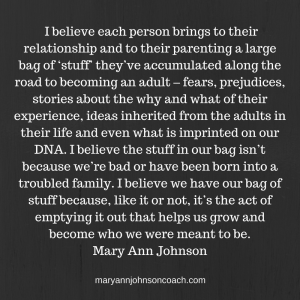

 I mentor mothers and one of the things we always have to work on is their tendency to believe that they are falling short, they are never going to measure up and that they are ruining their kids.
I mentor mothers and one of the things we always have to work on is their tendency to believe that they are falling short, they are never going to measure up and that they are ruining their kids. I remember one of my favorite things when I was living at home was sitting in our “library” with you talking about our love for books. You taught me to hunger for knowledge.
I remember one of my favorite things when I was living at home was sitting in our “library” with you talking about our love for books. You taught me to hunger for knowledge. There are so many things that I have learned from you but there are two things in particular that have forever changed me and how things have gone in my life. The first one was prayer. I remember always walking in on you praying. I knew Heavenly Father was your friend and that you trusted him.
There are so many things that I have learned from you but there are two things in particular that have forever changed me and how things have gone in my life. The first one was prayer. I remember always walking in on you praying. I knew Heavenly Father was your friend and that you trusted him. I really love my mother. And it is one of those interesting loves; the bigger the love gets, the bigger my heart gets, and the more it makes me love the entire world. Amazing!
I really love my mother. And it is one of those interesting loves; the bigger the love gets, the bigger my heart gets, and the more it makes me love the entire world. Amazing! I turned 40 years old a few weeks ago. It’s sort of a surreal experience for me because it’s the only age that I distinctly remember my mother being. She gave birth to her last child at 40, and so have I. I am now where my mother once was, a place I remember her being.
I turned 40 years old a few weeks ago. It’s sort of a surreal experience for me because it’s the only age that I distinctly remember my mother being. She gave birth to her last child at 40, and so have I. I am now where my mother once was, a place I remember her being.

 never occurred to me that it would be useful to have some type of plan, to learn new skills, to be clear that things don’t always work out the way you think they should and that people, even kids, get to decide how they want their lives to look and feel. It was sometimes a jolting and unnerving experience.
never occurred to me that it would be useful to have some type of plan, to learn new skills, to be clear that things don’t always work out the way you think they should and that people, even kids, get to decide how they want their lives to look and feel. It was sometimes a jolting and unnerving experience. Take my word for it, that it is wasted energy. Instead, celebrate the fact that you are a mother, that you are doing the best you can, and that you do have good desires in your heart for your family. Then get more education. Learn something new. Practice a skill you need and don’t quit till you are reasonably good at it. Be proactive. Mentor with a mom who is where you want to be. Keep working on yourself. Keep loving your family. Keep going!
Take my word for it, that it is wasted energy. Instead, celebrate the fact that you are a mother, that you are doing the best you can, and that you do have good desires in your heart for your family. Then get more education. Learn something new. Practice a skill you need and don’t quit till you are reasonably good at it. Be proactive. Mentor with a mom who is where you want to be. Keep working on yourself. Keep loving your family. Keep going!



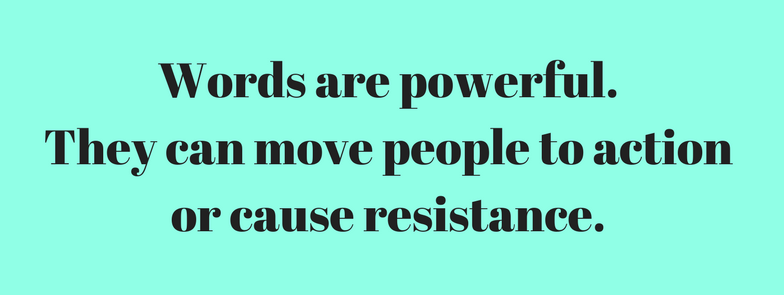

 Spring is here and one of the things that we may want our family to buy into is ‘Spring Cleaning’. That begs the question, can cleaning ever be fun?
Spring is here and one of the things that we may want our family to buy into is ‘Spring Cleaning’. That begs the question, can cleaning ever be fun? Let everyone in on the fun. Preschoolers enjoy helping with cleanup and can easily dust lampshades, books, and tabletops, or line up CDs. Let an older child help a younger child for more difficult tasks.
Let everyone in on the fun. Preschoolers enjoy helping with cleanup and can easily dust lampshades, books, and tabletops, or line up CDs. Let an older child help a younger child for more difficult tasks. much time you think it will take everyone to get their assigned chore done, 30 minutes, an hour. Now set the timer and play “Beat the Clock”. If someone finishes early, they can help someone else. They will want to do this because you have designed a reward for the family if they can “Beat the Clock”. Maybe it’s their favorite pie for dessert, maybe a trip to get ice cream, or a family movie, a walk to the park or a drive to see grandma.
much time you think it will take everyone to get their assigned chore done, 30 minutes, an hour. Now set the timer and play “Beat the Clock”. If someone finishes early, they can help someone else. They will want to do this because you have designed a reward for the family if they can “Beat the Clock”. Maybe it’s their favorite pie for dessert, maybe a trip to get ice cream, or a family movie, a walk to the park or a drive to see grandma.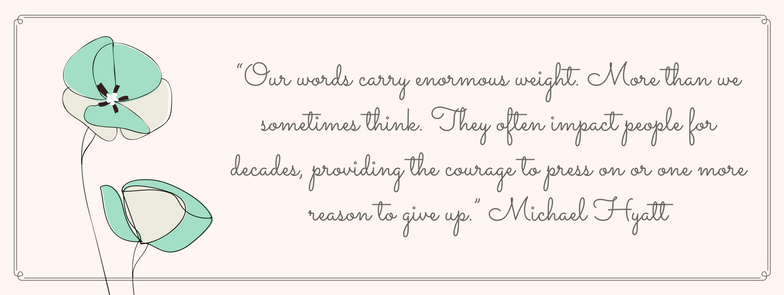
 My daughter Kate wore shoes that were a size too big for many years after she became a teenager. I didn’t realize she was doing that. In fact, she was married before I found out. Her husband found out first and he called her on it.
My daughter Kate wore shoes that were a size too big for many years after she became a teenager. I didn’t realize she was doing that. In fact, she was married before I found out. Her husband found out first and he called her on it. years into my adulthood. She owned a Sweet Shop in Afton, Wyoming. I loved going there and she would let me work the candy counter and bag popcorn.
years into my adulthood. She owned a Sweet Shop in Afton, Wyoming. I loved going there and she would let me work the candy counter and bag popcorn. Not only did I begin believing I was fat, I believed that I must be really unattractive because I was fat. But when I was seventeen I was at the home of a woman who was doing some alterations on a dress for me. Her husband told me that I had the most beautiful brown eyes. I know that it seems incredible because I didn’t even know the man, but I believed him. I had beautiful eyes! Even now at 65, when I look into the mirror I think to myself, “Man, you have beautiful eyes.”
Not only did I begin believing I was fat, I believed that I must be really unattractive because I was fat. But when I was seventeen I was at the home of a woman who was doing some alterations on a dress for me. Her husband told me that I had the most beautiful brown eyes. I know that it seems incredible because I didn’t even know the man, but I believed him. I had beautiful eyes! Even now at 65, when I look into the mirror I think to myself, “Man, you have beautiful eyes.”
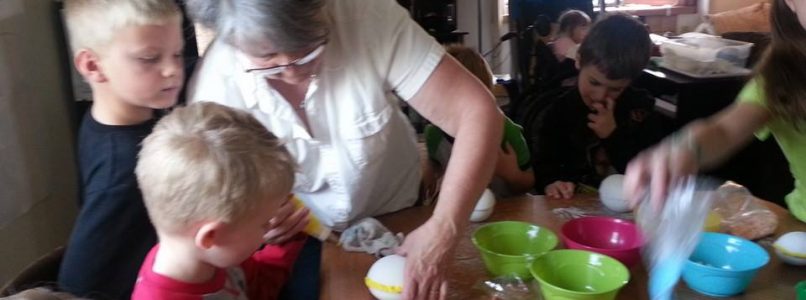
 I recall an Easter when I was a girl. There were nine of us children and my mom and dad lived on a shoestring. This particular year my mom couldn’t afford baskets and so she made a nest of Easter Grass (very cheap) for each of us. To make it more exciting she hid the nests all over the house. I recall mine was in the bathroom shower. I had a very creative mother. : )
I recall an Easter when I was a girl. There were nine of us children and my mom and dad lived on a shoestring. This particular year my mom couldn’t afford baskets and so she made a nest of Easter Grass (very cheap) for each of us. To make it more exciting she hid the nests all over the house. I recall mine was in the bathroom shower. I had a very creative mother. : )

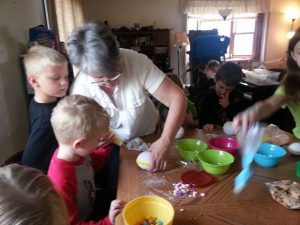

 Here is another very readable Easter book, Henri, Egg Artiste by Marcus Pfister. I like it because it’s about art!
Here is another very readable Easter book, Henri, Egg Artiste by Marcus Pfister. I like it because it’s about art!
 Spring is on the way! In my day that meant playing outdoors but things have changed.
Spring is on the way! In my day that meant playing outdoors but things have changed. find very large stones.Then we made a big pan of mud which we frosted the stones with. As soon as our “cakes” were frosted we decorated them with bits of leaves, grass, twigs, and flowers. Then we set them in the sun to dry. We got pretty creative. We played that game over and over all summer long.
find very large stones.Then we made a big pan of mud which we frosted the stones with. As soon as our “cakes” were frosted we decorated them with bits of leaves, grass, twigs, and flowers. Then we set them in the sun to dry. We got pretty creative. We played that game over and over all summer long. Queen Ann’s lace was cauliflower, yellow flowers were butter and we collected seeds and berries from plants, like her honeysuckle bush. We just picked whatever was available. It was really fun.
Queen Ann’s lace was cauliflower, yellow flowers were butter and we collected seeds and berries from plants, like her honeysuckle bush. We just picked whatever was available. It was really fun.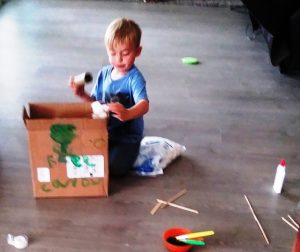 toilet paper tubes, cardboard corners off the frames I bought, old keys, pieces of plastic, – you know junk. Today Ben and Mary made leprechaun traps using the junk from the drawer. They had a wonderful two hours of creating. No technology, just themselves, their imagination and fun.
toilet paper tubes, cardboard corners off the frames I bought, old keys, pieces of plastic, – you know junk. Today Ben and Mary made leprechaun traps using the junk from the drawer. They had a wonderful two hours of creating. No technology, just themselves, their imagination and fun.